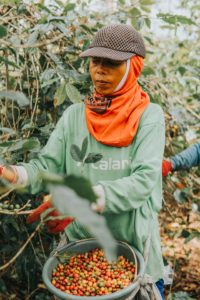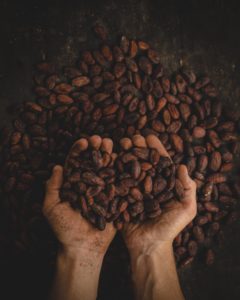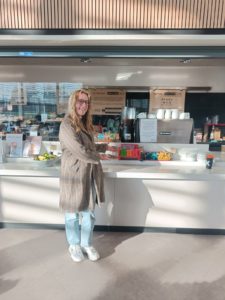With the University currently celebrating Fairtrade Fortnight (27th February - 12th March 2023), student and Climate Champion Lola Springbett has been exploring the links between Fairtrade and climate change. Read on to discover how you can take climate action through choosing Fairtrade.
Ever thought that Fairtrade was simply about chocolate and bananas?
Well, think again. It's so much more than that, and in this blog I hope to bring you greater awareness of the relationship between Fairtrade and climate change, as well as what you can do to fight for climate justice.

What does climate change mean for Fairtrade farmers?
Fairtrade farmers are among those who are experiencing some of the worst impacts of climate change. However, they contribute very little to the problem, given they often live in small, rural communities and their farming practices tend to be less intense. As an example, in the Ivory Coast, West Africa, there are many Fairtrade farmers and here, on average, seventeen people have the equivalent carbon footprint to just one person in the UK.
"Climate change is a global issue. We, the farmers, have to deal with its consequences every day.” - Ebrottié Tanoh Florentin, a Fairtrade cocoa farmer in the Ivory Coast
Across Africa, Asia, Latin America, and the Caribbean, small-scale farmers are feeling the devastating effects of the climate crisis. Additionally, compared to large-scale farmers, they are often less able to adapt and diversify in response to climate change. For example, as climate change exacerbates weather patterns that are unsuitable for coffee plants, seasonal work opportunities diminish, impacting livelihoods.
Furthermore, these farmers rely on the land they farm for their livelihoods and climate change makes it harder to farm land productively. For example, extreme heat or drought can restrict potential yields, which can increase competition for land as certain areas become climatically unsuitable for production.
Another key example of the impact of climate change on Fairtrade farmers is the rise of 'coffee rust', a disease which rots the leaves of a coffee tree and severely lowers the quality and quantity of the coffee fruits. Changing rainfall patterns and rising temperatures, associated with climate change, have been found to shorten the time it takes for a coffee tree with leaf rust to become infectious, increasing the rate of infection and disease spread. Coffee rust can cause yield losses in excess of 75% where severe outbreaks occur, and is responsible for $1-2 billion losses annually.
How does Fairtrade help?
Fairtrade campaigns for farmers to earn a living income, to empower them to effectively tackle the challenges affecting their communities, including the climate crisis, and to build resilience so that they can rely on sustainable livelihoods. Fairtrade also supports farmers in implementing short-term mechanisms to deal with immediate impacts, such as complete crop failures from extreme weather events, to increase farmers’ resilience. For certain farmers adaptation steps will include changing or diversifying crop or income sources.
Fairtrade is also an organisation that develops observational data, helping to monitor and interpret climate variations and climate change. The organisation helps farmers to combat climate change through technical advice from their expert Producer Networks. Databases of information are available to compare changes in the climate year on year and to inform crop planning.
Fairtrade also promote environmentally-friendly Fairtrade Standards, which require small producers to take steps in order to:

- Adapt to climate change
- Reduce the production of greenhouse gases and increase carbon sequestration (this is the process of removing carbon from the atmosphere)
- Avoid deforestation and protect forests
- Tackle soil erosion and increase soil fertility
- Reduce water usage
Fairtrade supports Fairtrade farmers in applying these changes and, in doing so, it increases empowerment and resilience for these farmers in the face of climate change.
What can you do to help?
Climate change is a threat to the livelihoods of the people who grow the goods we depend on. Therefore, to become more responsible consumers, there are simple steps we can take to bring both environmental and social benefits. With over 6,000 products available, switching to Fairtrade products is an easy way to make an impact on the lives of farmers and workers, as well as improving and securing food sustainability to fight against the climate crisis and to mitigate against its’ effects.
At University of Bath you can find a great range of Fairtrade products in the outlets on campus:
- All Fairtrade hot drinks sold within hospitality outlets are Fairtrade
- There is a range of food products which can be found in hospitality outlets including Tony’s Chocolonely bars, Divine chocolate bars, One World sweet treats and Karma Cola.
- In Fresh, many Fairtrade products can be found including bananas, sugar, coffee, tea and chocolate.
- The Market also supports Fairtrade with many food items as well as Fairtrade clothing by Neutral.
In terms of the outlets to be found off campus, I particularly like Harvest, an independent grocer in Bath that stocks organic, Fairtrade and veggie-friendly goods. It’s a great spot to find high quality drinks and snacks carrying the Fairtrade mark.

Ensuring an improvement in the lives of producers and their surrounding communities can involve a higher price for us consumers in comparison with non-Fairtrade alternatives. However, while the difference for us is often quite small, it makes all the difference to ensure farmers make a liveable wage and promote sustainability in food production. It is also possible to balance this difference out by perhaps cutting costs in other areas. For example, I often choose to walk to campus which saves the cost of the bus (and that's another way of doing your bit for the planet!). It’s important to highlight the feel-good factor that comes with making the switch to Fairtrade, knowing that the extra money spent goes to a valuable cause.
Be sure not to miss the activities happening on campus this Fairtrade Fortnight! You can still catch:
- Fairtrade Foundation Talk - Thursday 9 March
- Fairtrade and Sustainable Market in the Claverton Rooms - Friday 10 March
- Tony's Chocolonely Talk, 'The Story of an Unusual Chocolate Bar’ - Friday 10 March
 Lola Springbett
Lola Springbett
Climate Champion and 4th year International Management and Modern Languages (Spanish) student
Responses





Excellent Blog Lola, informative and a good reminder to us all in making fairtrade choices and the benefits